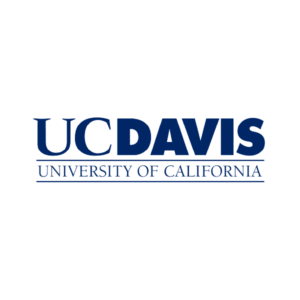The University of California, Davis, a large public institution, has become one of the country’s top tier-one research universities. The institution was first founded as an agricultural branch of the system in 1905 and became the seventh campus of the University of California in 1959. It is located in the heart of California’s central valley, 10 miles from the state capital city of Sacramento, in the lovely city of Davis, which was built around the university and continues to provide a safe and friendly environment supportive of student learning. UC Davis has expanded over the past century and now has 104 undergraduate majors and 101 graduate and professional programs. Several of its programs are among the best in the country and have been for decades. It is ranked 1st in the nation in agriculture and veterinary medicine and 2nd nationally among public universities. As the top ranked campus in the country for sustainability and internationalization, UC Davis continues to be a leader in solving some of the world’s greatest challenges.
Academic: GPA of 3 or above on their studies to date
English Language:
– IELTS: 6.5
– TOEFL iBT: 80
– Duolingo English Test: 115
05 August 2024 – 13 December 2024
Applicants 2022
Applicants : 509 students
GPA : 3.00-4.00
TOEFL iBT Score : 84-95
IELTS Score : 6.5-8.5
Duolingo English Test Score : 95-155
Awardees 2022
Awardees : 25 students
GPA : 3.50-3.99
TOEFL iBT Score : –
IELTS Score : 8.5
Duolingo English Test Score : 135-155
Applicants 2023
Applicants : 285 students
GPA : 3.00-4.00
TOEFL iBT Score : 112
IELTS Score : 6.5-8
Duolingo English Test Score : 55-155
Awardees 2023
Awardees : 25 students
GPA : 3.00-3.99
TOEFL iBT Score : –
IELTS Score : 8
Duolingo English Test Score : 125-155
Available Courses
Analysis of film form and narrative, including cinematography, editing, and sound. Issues in film studies including authorship, stardom, race, gender, class, and cultural identity. Introduction to selected cinematic movements and national film traditions.
Analysis of the allocation of resources and the distribution of income through a price system; competition and monopoly; the role of public policy; comparative economic systems.
Analysis of the economy as a whole; determinants of the level of income, employment and prices; money and banking, economic fluctuations, international trade, economic development; the role of public policy.
Students from all majors will learn the processes involved in modern entrepreneurship and identify an opportunity for innovation. The 3 C’s of the entrepreneurial mindset (developed by KEEN) will be covered: Curiosity, Connections, and Creating
Values.
Introduction to modes of fresh food preservation including use of chemicals and microbes, heat and energy, control of water and atmosphere, and by indirect approaches such as packaging, hygienic design and sanitation.
Nutrition as a science; historical development of nutrition concepts; properties of nutrients and foods.
Sociological approaches to study of historical and contemporary culture and mass media, and their structuring in relation to social actors, institutions, stratification, power, the production of culture, audiences, and the significance of culture in processes of change.
Explorations of how brain secretes mind, via computer simulations that are manipulated and probed to investigate how neurons produce perception, attention, memory, language, and cognitive control.
Communication competence in professional settings. Managing face-to-face and virtual teams. Leadership, conflict management and negotiation skills. Communication in diverse organizations. Leveraging communication networks. Effective interviewing.
Economic concepts and policy issues associated with natural resources, renewable resources (ground water, forests, fisheries, and wildlife populations) and non-renewable resources (minerals and energy resources, soil).
Non-mathematical introduction to how chemical engineers think, illustrated by elucidation of the process of roasting and brewing coffee. Qualitative overview of the basic principles of engineering analysis and design. Corresponding experiments testing design choices on the sensory qualities of coffee.
Introduction to basic concepts in political analysis and application of them in comparative studies of selected countries. Coverage is given to cultural and other informal dimensions of politics as well as to more formal political and governmental structures.
Principles and basic concepts of psychology. The empirical study of individual behavior including perception, cognition, development, personality, social interactions and the biological underpinnings of behavior.
Role of organizational design and behavior in business and public agencies. Principles of planning, decision making, individual behavior, management, leadership, informal groups, conflict and change in the organization.
History of mass media and media research traditions. Organization and economics of the media industry. Media policy, law, regulation and ethics. Impact of the media on individuals and society. Traditional, new and emerging communication technologies.
Use of theater techniques for development of clear oral and physical communication skills that build confidence, presentational style and clarity for students whose command of English is at a competent to fluent level.
Methods of design and analysis for sensory food science. Experimental design strategies. Use of taste panels and
consumer testing. Data analysis and computation including the relative merits and limitations of parametric and nonparametric approaches. Modifications for quality assurance.
Develop an analytical framework to manage and monitor business systems concerned with operational, human, and organizational interactions. Introduction to computer hardware, systems software, and information systems. Management of information technology and the impact of information systems on modern management.
Develops key concepts and relationships between supply chain design and business models and strategies. Much of the focus is on quantitative techniques for analysis & management of the production and delivery of goods & services by an organization.
Highlights a current issue and/or controversy found in contemporary society and looks at how this problem impacts and is affected by the physical, social and biological sciences.

